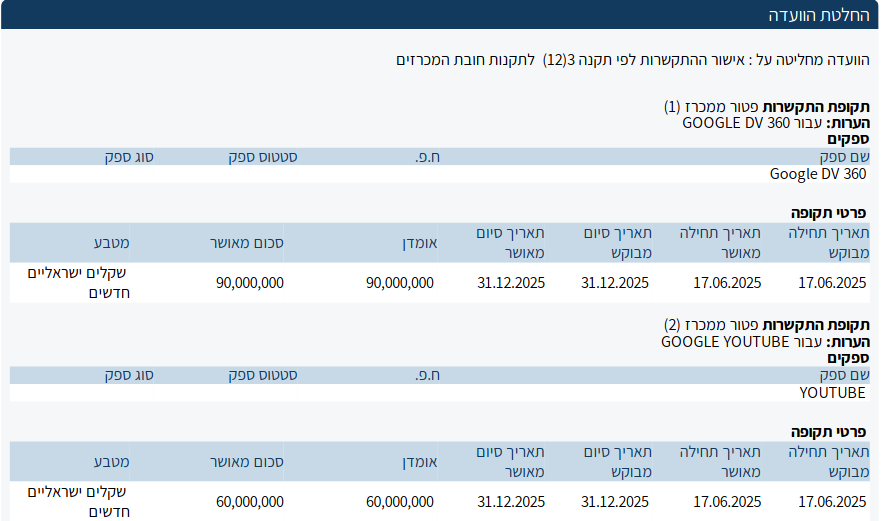Israeli Lawmakers Demanded Better PR to Conceal Gaza Famine. Google Obliged.
Exclusive look at Israeli government contracts for online ads claiming that there is no hunger or starvation in Gaza.
Investigation published in partnership with Drop Site News.
On March 2, 2025, hours after the Israeli government announced the blockade of all food, medicine, fuel, and other humanitarian supplies from entering Gaza, lawmakers in Jerusalem demanded answers—not on the devastating human toll of such a decision, but on how Prime Minister Benjamin Netanyahu’s office was preparing to handle the public relations fallout.
“I began with the example of the cessation of humanitarian aid—did you prepare for this thing this morning?” asked Knesset member Moshe Tur-Paz, the chair of a subcommittee on Foreign Affairs in Israel’s parliament.
Avichai Edrei, a spokesperson for the Israel Defense Forces who was asked the same question later in the hearing, assured the legislators work was underway, stating, “We could also decide to launch a digital campaign in this context, to explain that there is no hunger and present the data.”
Publicly available government contracts show that Israel’s advertising bureau, which reports to the prime minister’s office, has since embarked on a mass advertising and public messaging effort to conceal the hunger crisis. The push includes the use of American influencers widely reported on last month. It also includes a high-dollar spending spree on paid advertising, yielding tens of millions for Google, YouTube, X, Meta, and other tech platforms.
“There is food in Gaza. Any other claim is a lie,” asserted a propaganda video published by Israel’s foreign ministry to Google’s YouTube video sharing platform in late August and viewed more than 6 million times.
Much of the video’s reach results from an ad placed during an ongoing and previously unreported $45 million (NIS 150 million) advertising campaign initiated between Google and Netanyahu’s office in late June. The contract—which is with both YouTube and Google's advertising campaign management platform, Display & Video 360—explicitly characterizes the ad campaign as hasbara, a Hebrew word whose meaning is somewhere between public relations and propaganda.

Records show that the Israeli government similarly spent $3 million (NIS 10 million) for an advertising campaign with X. The French and Israeli advertising platform Outbrain/Teads is also set to receive roughly $2.1 million (NIS 7 million).
The ads have aired in response to increasing global outcry over the deteriorating situation in Gaza. In August, the UN formally declared a famine in Gaza governorate, which includes Gaza City. The Integrated Food Security Phase Classification (IPC), the leading global authority on food security, projected the threshold for famine would be crossed in Deir al-Balah and Khan Younis in the coming weeks, stating "this Famine is entirely man-made, it can be halted and reversed.”
The UN aid coordination office OCHA further warned on Friday of “a descent into a massive famine” in the Gaza Strip.
At least 367 Palestinians, including 131 children, have died as a result of hunger and malnutrition since the war began, according to the health ministry in Gaza.
The existence of an Israeli Google ads campaign to discredit the UN’s primary aid agency for Palestinian refugees, UNRWA, was similarly reported by WIRED last year. Hadas Maimon, head of public awareness for Israel’s diaspora ministry, stated during the March 2 Knesset hearing that, “For almost a year now, we have been leading a major campaign on the issue of UNRWA.”
Other Israeli government ads on Google’s platforms accused the United Nations of “deliberate sabotage” of aid delivery into Gaza and promoted the Gaza Humanitarian Foundation, which is backed by Israel, the U.S., and unnamed European countries. One campaign promoted prosecution of the militant group Hamas, which governs the Gaza Strip, for debunked allegations of mass sexual violence as a result of a controversial report published by the Israeli advocacy group Dinah Project.
Despite the denial about the famine, prominent Israeli government voices have championed the effort to cut off food and water to Gazans as a strategy for inducing mass migration out of the territory. “In my opinion, you can besiege them,” said Bezalel Smotrich, the Israeli Finance Ministry and a coalition partner to Netantayu’s government, according to Channel 12. “No water, no electricity, they can die of hunger or surrender,” Smotrich said.
Amichay Eliyahu, the Knesset member who leads the Heritage Ministry in Netanyahu's government, has similarly called for starving the Palestinian population of Gaza. "There is no nation that feeds its enemies,” Eliyahu said during a radio interview in July. In May, the minister argued the Palestinians "need to starve" and added, "If there are civilians who fear for their lives, they should go through the emigration plan."





